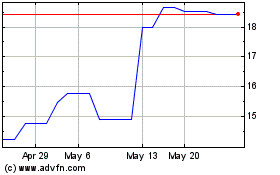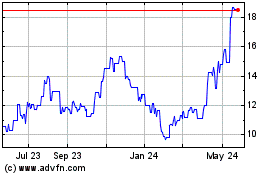Venture with Geeley in China will focus on struggling Smart
compact city auto
By William Boston in Berlin and Trefor Moss in Shanghai
This article is being republished as part of our daily
reproduction of WSJ.com articles that also appeared in the U.S.
print edition of The Wall Street Journal (March 29, 2019).
Daimler AG and Chinese auto maker Zhejiang Geely Holding Group
have agreed to create a joint venture in China to transform
Daimler's struggling Smart compact city car into a global
all-electric brand, the companies said Thursday.
The agreement is the latest evidence of China's breakthrough as
the world's leading market for electric cars. Some 1.26 million
electric vehicles were sold there last year, roughly 60% of the
global total and manufacturers' enthusiasm for the market remains
undimmed despite the recent slowdown in China's economic
growth.
Last year, BMW AG formed a joint venture with Great Wall Motor
Co. that will produce an electric version of the Mini small car.
Another new joint venture between Volkswagen AG and Anhui Jianghuai
Automobile Co. dedicated to producing electric vehicles is set to
start production this year.
The deal between Daimler and Geely marks the first major venture
from the partnership born in the wake of Geely Chairman Li Shufu's
acquisition last year of nearly 10% of Daimler shares, which made
Mr. Li the largest shareholder in the maker of Mercedes-Benz luxury
vehicles. Previously, Daimler and Geely agreed to work together on
a ride-hailing venture.
"We will jointly design and develop the next generation of smart
electric cars that combine high-quality production and known safety
standards for sale both in China and globally," Daimler CEO Dieter
Zetsche said.
Mr. Li said the Smart brand had a "unique appeal and strong
commercial value."
The venture between Daimler and Geely will be based in China and
in 2022 will begin building a new generation of electric Smart
vehicles there. Until the beginning of production in China, Daimler
will continue to build current Smart models at its Hambach plant in
France. In the future, it will make its new all-electric Mercedes
EQC model there.
The companies didn't release financial details of the joint
venture, which is expected to be completed by the end of the
year.
The agreement marks a deepening of Geely's partnership with
Daimler, which began last year when Mr. Li amassed a 9.7% stake in
the company. The holding was worth around $9 billion when the
purchase was revealed in February 2018, although Daimler's share
price has fallen significantly since then. In October, Geely and
Daimler announced they were setting up a premium ride-hailing
service in China in their first cooperative step.
The tie-up makes good sense for both partners, said Janet Lewis,
head of industrials and transportation in Asia at Macquarie Group.
"For Geely, if it works well, there is more to gain by moving
closer to Daimler," said Ms. Lewis. And for Daimler, "partnering
with Geely helps spread the risk" of attempting to revive a brand
that needs major investment if it's to survive and thrive.
Daimler is betting Smart's survival on China's lower
manufacturing and labor costs and its burgeoning electric-vehicle
market.
The growing partnership between the two has signaled Geely's
arrival as an important new player in the global auto business,
after a spree of acquisitions that began with the 2010 purchase of
Volvo Cars from Ford Motor Co. Analysts were initially skeptical of
Geely's ability to run Volvo, but under Mr. Li the Swedish auto
maker has enjoyed an impressive revival, topping 600,000 annual
sales for the first time last year.
The future of Smart, which makes small city cars, had been
uncertain: analysts say the unit has probably never made money in
its 21 years of operations, and Daimler has never published figures
to counter that impression. Arndt Ellinghorst, an automotive
analyst at Evercore ISI, a brokerage, estimates that Smart loses as
much as EUR700 million ($787 million) a year because of high
production costs in Europe.
Evercore had advised Daimler to abandon Smart entirely, Mr.
Ellinghorst said in a note to clients, doubtful that the brand
could be revived. But after the announced partnership with Geely,
Mr. Ellinghorst saw a thin ray of hope.
"If the brand can successfully transition into the subcompact
segment it may be able to price accordingly and turn the business
around. But for now we remain skeptical," he said.
Daimler sold over 2.3 million Mercedes-Benz cars in 2018,
compared with 128,802 Smarts.
In 2014, Daimler teamed up with Groupe Renault to create a
common platform for some new Renault and Smart vehicles as a way of
sharing development costs. Geely's interest in Smart would likely
mark the end of Renault's involvement, according to a person
familiar with the arrangement.
Renault said in emailed comments that it cooperated with Daimler
on many fronts and saw no changes from the Geely partnership.
Geely has been growing its international footprint. It acquired
a controlling stake in Malaysian auto maker Proton in 2017,
launching its first local product in December. It also controls
British sports-car maker Lotus Cars, and in 2017 invested $3.24
billion in a stake in Swedish truck-and-bus maker Volvo AB (which
is separate from Volvo Cars).
The Geely group sold 2.15 million vehicles last year, with the
company's main Chinese brand, Geely Auto, contributing around 1.4
million of those. Lynk & Co., a new Geely brand targeting young
urban buyers with internet-connected vehicles, sold over 120,000
cars in its first full year of sales.
Write to William Boston at william.boston@wsj.com and Trefor
Moss at Trefor.Moss@wsj.com
(END) Dow Jones Newswires
March 29, 2019 02:47 ET (06:47 GMT)
Copyright (c) 2019 Dow Jones & Company, Inc.
Great Wall Motor (PK) (USOTC:GWLLY)
Historical Stock Chart
From Oct 2024 to Nov 2024

Great Wall Motor (PK) (USOTC:GWLLY)
Historical Stock Chart
From Nov 2023 to Nov 2024
